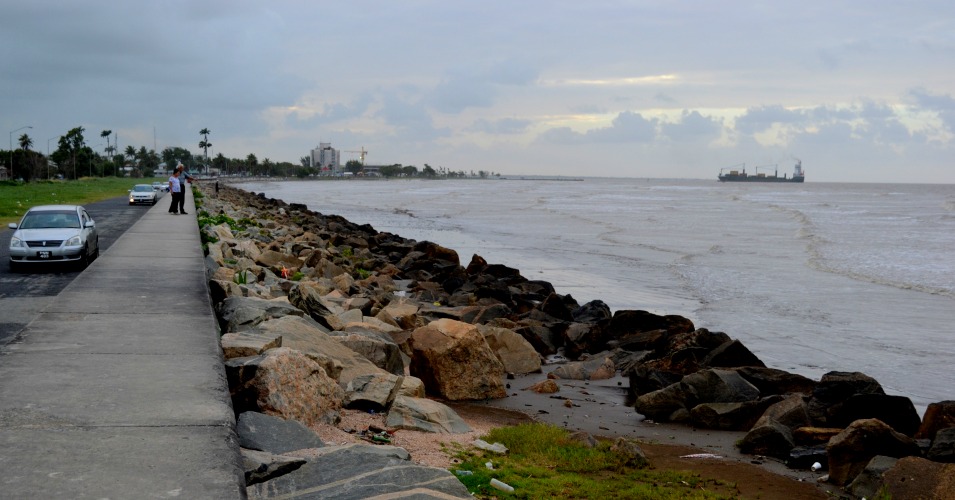
(Global Witness, 11.Jan.2021) — The climate emergency is the greatest threat facing the world. If we are to prevent its worst impacts we all must act now. For Global Witness this has meant redirecting our efforts to fighting the main drivers of the climate crisis: deforestation, the extraction and burning of fossil fuels and the corporate capture and other abuses of power driving these destructive activities.
Our February 2020 report on Guyana’s oil sector, Signed Away, is not consistent with that focus and for this reason that we have decided to remove it from our website and stop using it in our campaigning work. We regret any unintended negative consequences arising from the report, including its stifling of debate within Guyana around actions to address climate change.
Since Global Witness started work in 1993 we have sought to end the environmental destruction that harms so many people around the world – holding the powerful to account while advocating for people who have lost their livelihoods or lives.
However, as the destructive impacts of the climate crisis – flooding, desertification, famine – have become more acute, it has become clear that our work needs to change. It is no longer enough for Global Witness to demand that oil and gas businesses operate in a more transparent and accountable manner. We firmly believe that to save the climate, we need to work with others to achieve a just and equitable phase out of fossil fuel extraction. To do this, we need to elevate the voices of activists fighting the forces driving the climate breakdown around the world.
Our Signed Away report focused on how much revenue Guyana could obtain from oil if the government negotiated a fairer deal with oil major Exxon. Our revenue analysis assumed that Paris Agreement climate commitments would not be implemented – leading to an overestimation of the amount of oil Guyana would likely produce and the value of that oil. Under the new organisational strategy we have rolled out this year, this is not a scenario that we would accept because greenhouse gases have to fall by half over the next decade, for the sake of the planet and all of us living on it.
Moreover, since publication, oil prices have dropped by more than a third. As COVID-19 continues to depress demand for fossil fuels and as countries implement policies to restrict the use of fossil fuels in order to tackle climate change, the prospects for sustainable income generation from new oil projects are increasingly questionable.
These factors led us to overestimate the potential economic benefit of oil extraction. Based on feedback from civil society representatives in Guyana, we recognise that our report has made it harder for them to argue the case for cessation of oil production in their country.
Global Witness’ decision to withdraw Signed Away is not an endorsement of the way Exxon or Guyanese officials negotiated the oil licences awarded to the company. We stand by the integrity of the evidence we have presented. We also stand by the fiscal model produced by OpenOil that was commissioned by Global Witness. Expert, transparent, and instructive, OpenOil’s work and its fiscal model are standard-setting.
Most importantly, we strongly support the inspiring investigations and campaigning that so many Guyanese reporters, campaigners, and experts have undertaken in recent years to increase accountability around the deals between Guyana’s government and Exxon and other oil companies. It is this work that will hold the powerful to account and Guyanese people should be proud to have such relentless advocates working for them.
(Global Witness, 11.Jan.2021) — The climate emergency is the greatest threat facing the world. If we are to prevent its worst impacts we all must act now. For Global Witness this has meant redirecting our efforts to fighting the main drivers of the climate crisis: deforestation, the extraction and burning of fossil fuels and the corporate capture and other abuses of power driving these destructive activities.
Our February 2020 report on Guyana’s oil sector, Signed Away, is not consistent with that focus and for this reason that we have decided to remove it from our website and stop using it in our campaigning work. We regret any unintended negative consequences arising from the report, including its stifling of debate within Guyana around actions to address climate change.
Since Global Witness started work in 1993 we have sought to end the environmental destruction that harms so many people around the world – holding the powerful to account while advocating for people who have lost their livelihoods or lives.
However, as the destructive impacts of the climate crisis – flooding, desertification, famine – have become more acute, it has become clear that our work needs to change. It is no longer enough for Global Witness to demand that oil and gas businesses operate in a more transparent and accountable manner. We firmly believe that to save the climate, we need to work with others to achieve a just and equitable phase out of fossil fuel extraction. To do this, we need to elevate the voices of activists fighting the forces driving the climate breakdown around the world.
Our Signed Away report focused on how much revenue Guyana could obtain from oil if the government negotiated a fairer deal with oil major Exxon. Our revenue analysis assumed that Paris Agreement climate commitments would not be implemented – leading to an overestimation of the amount of oil Guyana would likely produce and the value of that oil. Under the new organisational strategy we have rolled out this year, this is not a scenario that we would accept because greenhouse gases have to fall by half over the next decade, for the sake of the planet and all of us living on it.
Moreover, since publication, oil prices have dropped by more than a third. As COVID-19 continues to depress demand for fossil fuels and as countries implement policies to restrict the use of fossil fuels in order to tackle climate change, the prospects for sustainable income generation from new oil projects are increasingly questionable.
These factors led us to overestimate the potential economic benefit of oil extraction. Based on feedback from civil society representatives in Guyana, we recognise that our report has made it harder for them to argue the case for cessation of oil production in their country.
Global Witness’ decision to withdraw Signed Away is not an endorsement of the way Exxon or Guyanese officials negotiated the oil licences awarded to the company. We stand by the integrity of the evidence we have presented. We also stand by the fiscal model produced by OpenOil that was commissioned by Global Witness. Expert, transparent, and instructive, OpenOil’s work and its fiscal model are standard-setting.
Most importantly, we strongly support the inspiring investigations and campaigning that so many Guyanese reporters, campaigners, and experts have undertaken in recent years to increase accountability around the deals between Guyana’s government and Exxon and other oil companies. It is this work that will hold the powerful to account and Guyanese people should be proud to have such relentless advocates working for them.
Most importantly, we strongly support the inspiring investigations and campaigning that so many Guyanese reporters, campaigners, and experts have undertaken in recent years to increase accountability around the deals between Guyana’s government and Exxon and other oil companies. It is this work that will hold the powerful to account and Guyanese people should be proud to have such relentless advocates working for them.
__________
